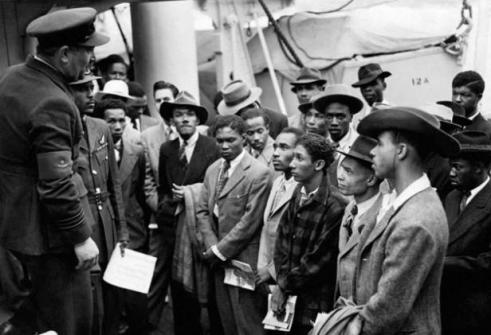In my previous posting Back To Africa Part 1 – Elmina Castle, Cultural Tourism and the Psychological Scars of Slavery, I related my harrowing visit to the slave fort on Ghana’s Cape coast, and the long-lasting damage that the Transatlantic Slave Trade visited on Blacks in the diaspora. I also recalled how far removed from Africans born on the continent I felt on that day.
But that traumatic day has not put me off from returning to Africa. It has merely modified my perspective. What I hope readers gain from the previous posting, is that we Blacks in the diaspora cannot go back to Africa with some romantic notion of returning to the motherland to be reunited with our long lost brothers, like Rastafarians ‘returning’ to Ethopia. We cannot regain what we lost 400 years ago. What I am advocating is a return to Africa for economic not romantic motives.
We Blacks in the diaspora are spread all over the globe for economic reasons. We were taken from Africa to work on plantations in the Caribbean and North America. Many of us got our first taste of Europe when we dutiful fought for our masters in the Second World War, and were bitterly disappointed when after the war ended we returned home to America and the Caribbean to resume lives as second-class citizens. My own forefathers left the Caribbean in the 1950’s answering the call from the ‘mother country’ to help rebuild Britain after the war. Caribbean immigrants helped to rebuild cities devastated by the Blitz, helped to staff the newly conceived National Health Service, and found jobs on public transport, and in the Post Office. But that was a long time ago.
Our parents and grandparents of the Windrush generation had accepted the menial jobs and daily humiliations of life in Britain with the hope of giving their children a better life. They believed that if their children had the benefit of an English education they would enjoy the same life chances as the indigenous English. Sadly it didn’t turn out that way. Caribbean immigrants coming to Britain in the 50s and 60s were coming to a buoyant labour market, to take up jobs in an expanding economy that had recruited them for jobs for which there was no local competition. But the recession of the early 1980s reduced our prospects to no better than those of whites, and the recession of the early 1990s reduced our rate to well below that of whites. Despite what our parents and grandparents had hoped, prospects for the second and third generation are actually worse than they were for their pioneer immigrant generation. In short the immigrant bubble has burst and this, once desperately needed foreign workforce, is now surplus to requirements. We now have two generations of Black people born in Britain with the benefit of a English education, often to University level, but still unable to find employment. The unemployment rate for young Black males in the UK is now 55%, a figure which has almost doubled since 2008. This wasted generation now fill the British prisons and psychiatric hospitals, or run wild on the streets murdering other Black boys, or rioting and looting because they feel they have no hope for advancement and no stake in the country of their birth.

Young Black men in Britain and America feel betrayed and abandoned and are lashing out in anger and frustration.
But it needn’t be this way. Though the opportunities may have dried up in the UK, opportunities abound in Africa. This lost generation could be directing their energies to building up the economies of the land of their forefathers, rather than turning their hurt, alienation and anger inwards or lashing out at everything around them. In short, rather than sitting down wasting your life growing old and bitter in Britain, go West young man and grow rich in Africa.
In a previous blog entitled The Fall of the West and the Rise of the Rest, I contrasted the financial crisis in the Eurozone with the rise of African economies. In September of this year I went on a one week fact finding mission to Ghana to see for myself. This was not my first time on the continent, but it was the first time I had gone looking for economic opportunities. Below are the results of my reconnaissance mission.
First of all it is important for any potential returnees to realise that this is not the same scenario as when our Grandparents came to Britain in the 50s. Don’t go to Africa looking for a job, go looking for a business opportunity.
The other thing that all entrepreneurs must consider wherever they set up business is, ‘who are my customers?
To answer this I will breakdown modern Ghanian society. As it was explained to me there are five different communities in Accra.
- the Ghanian elite (the political class, the super-rich, gold traders etc.) who run the country.
- The ex-pat community (which consists of foreign business people, aid workers, NGOs, charity workers, people at the IMF, World Bank etc) who really have no interest in the country and are here merely to do a job for a few years and then leave.
- The Ghanian professional class –the doctors, lawyers etc,
- the everyday working Ghanian people,
- the returnees – Black people from across diaspora who have chosen to settle here.
From my quick assessment, the client base of any returnee must be the elites, the ex-pats and the returnees. These groups are most likely to have spent time in the West, and in this time they will have developed a taste for goods and services that we take for granted here, but are simply not available over there. Take for example Tracey.
Abena is of Ghanian parentage, but grew up in the US where she worked in finance. That’s what she’s been doing since she returned to Ghana, but like so many returnees, once settling here she has seen a gap in the market – Laundromats! Very few people have washing machines in Ghana. The poor wash their clothes by hand, and the rich pay the poor to wash their clothes by hand. Young professionals have neither the time nor the inclination to wash all their dirty laundry by hand, but may not have staff to do it for them, but there are no laundrettes that they can go to. Hence Abena plans to quit her job in finance later in the year and open the first in what she hopes will be a chain of laundrettes. A very simple idea that would have no hope of success in the UK or US, but apparently can be a major money-spinner in developing Ghana.
What follows are more stories of some of the returnees I met whilst out there.
Giles is half Ghanian and used to work in finance and media in London, but couldn’t stand the weather, and the stress, and the 15 hour work days, so when holidaying here he looked for business opportunities, and eventually decided on Pest control. Not at all glamorous, but apparently very lucrative.
Kofi is, Ghanian born, English educated, who was involved in the music business in the UK and the States for many years before returning to Ghana to help run his father’s now successful consultancy firm. With his music industry experience Kofi revealed to me another business opportunity. Apparently there is no organised collection of music royalties in Africa – a job that is done in the UK by the PRS. All those clubs, bars, and hotels playing western music are not paying for the privilege, as they would have to in the West. Kofi is also actively trying to encourage more Black UK and American music stars to come to Ghana to perform, and if the money they would make from performing in one country is not enough, then why not do a continent wide tour – Ghana, Nigeria, South Africa etc. in order to keep the prices of the tickets down, get sponsorship from those Western companies who are trying to expand into Africa.
George was born in Ghana and lived there until he was 15. As his father was an Ambassador in Libya he completed his education in Malta. In the 90’s he ended up working in the hospitality industry in London for , managing upmarket joints like Smollenskys, China House, and finally Hakkasan – a high pressure job with long hours and big expectations from bosses and big monied investors who would not tolerate failure. But the pressure became intolerable and he decided to quit, sold all his suits, gave away his shoes and moved back to Ghana to set up a guest house. He now wears t-shirts and sandals to work everyday, earns considerably less money than he did back then, but has a much better quality of life.
As you will have no doubt noticed all of the case studies I have related have family links in Ghana. What about those who have no family links with the country? If you are going to go to Africa why choose Ghana in preference to any other African country? As it was explained to me, there are other thriving economies in Africa, such as South Africa and Nigeria, but they are racked with political instability and crime. Just this year we’ve seen the terrorist attacks of Boko Haram in Nigeria and the Lomin Mine massacre in South Africa. Meanwhile, after the death of the Ghanian president, power was handled over peacefully and without incident to his V.P. If you’re rich in South Africa or Nigeria, you can’t leave your house without bodyguards and your children must be driven to school for fear of kidnapping. Ghana by comparison is relatively crime free. Here you are free to grown rich, and enjoy your money without fear of someone trying to take it or your life from you.
I also met Americans Richard and Cassandra who have set up an aqua-ponic farm. Under specially constructed tents kept constantly watered by the over-flow from a fish-tank and fertilised with fish waste, they grow cherry tomatoes. Apparently tomatoes are hard to get in Ghana, and this farm is set to make them millionaires. It seems strange to think that one could become a millionaire from something that looks like little more than a high tech allotment plot, but this is Africa, it is still a developing continent with many opportunities still available.
A successful returnee I met on my last night, was Ghanian-born Kwaku. Kwaku had been working as a Gold trader in Europe, when he then thought ‘why not set up shop in the country of his birth, where the resource he was trading in is mined from in the first place. Apparently at first it was a struggle, but after seven hard years, he had built up a successful business and considerable fortune. We talked for most of the evening on the pros and cons of living in Ghana. The inefficient police force, the inadequate health care system, the political corruption etc, but none of this put me off. After all, this softly spoken, mild mannered Black man that I was sitting next to is a millionaire, who has made his fortune in Ghana. To me, that fact speaks louder than any of his words.
Are you inspired yet? Throw away that X-box controller, dash ‘way the TV remote, tell you’re slave driver boss that you’ve got somewhere he can kiss, tell the Job Centre to stick their job Seekers Allowance! Rise up my mighty people, awake from your coma – opportunity awaits in Africa!






